Business
Capitalist Sage: How to Financially Survive COVID-19
Published
5 years agoon
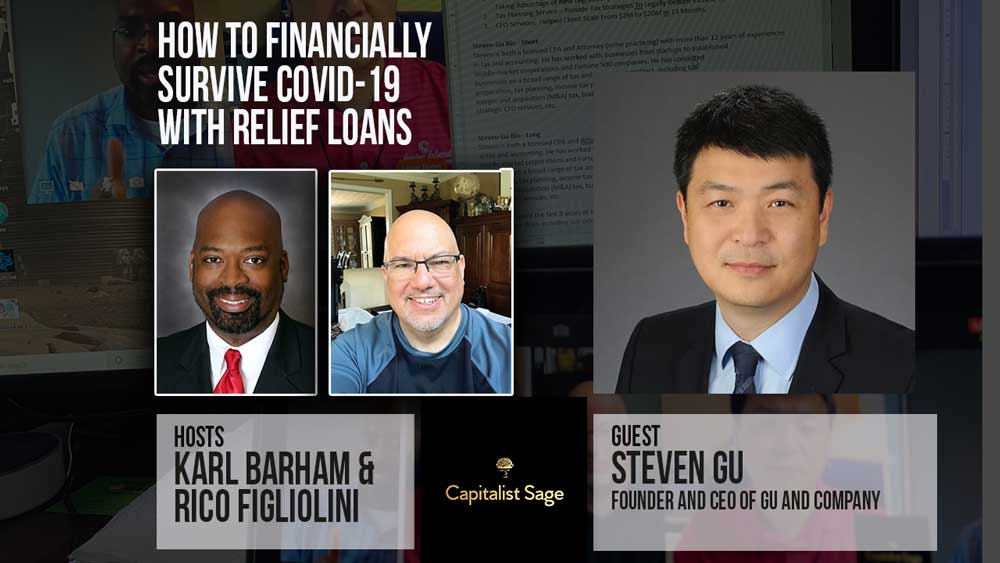
Business taxes and financials are already tricky enough to navigate, but with loans and other financially related acts surfacing in a response to COVID-19, the financial waters are even harder to tread. Luckily, in this episode of the Capitalist Sage, Steven Gu founder and CEO of Gu and Company shares some of his professional insight. Join Karl Barham, Rico Figliolini, and GU as they discuss PPP loans, the Care Act, COVID-19 response, and much more.
Resources:
LinkedIn: https://www.linkedin.com/in/steven-gu-cpa-ll-m-tax-64534a4
Facebook : https://www.facebook.com/stephen.koo.5682
Website: www.gucpagroup.com
“We went through a change a little bit. When we do the tax plan before pre-COVID-19, we always try to focus on how to save people money. But now we are looking, not just at saving people money, saving people tax, but also helping them to generate cash. Bringing the cash to your pocket right now.”
Steven gu
Timestamp:
[00:00:30] – Intro
[00:02:49] – About Steven
[00:04:23] – Preparing for the Crisis
[00:07:06] – The Loan Process
[00:09:13] – Large Banks vs. Community Banks
[00:13:57] – Changing Laws
[00:24:09] – The Tax Benefit Buffet
[00:30:16] – Long Term Planning
[00:35:02] – Closing
Podcast Transcript
Karl: [00:00:30] Welcome to the Capitalist Sage podcast. We’re here to bring you advice and tips from seasoned pros and experts to help you improve your business. I’m Carl Barham with Transworld business advisors, and my cohost is Rico Figliolini with Mighty Rockets, digital marketing, and the publisher of the Peachtree Corners Magazine. Hey Rico. How you doing today?
Rico: [00:00:47] Good Karl. Thank you.
Karl: [00:00:49] Why don’t we get started by introducing our sponsors?
Rico: [00:00:52] Sure. Our lead sponsor for this show, as well as the other family of podcasts that we do is Hargray Fiber, and just want to introduce them. They are a regional company that handles cable fiber, optic connections. Bandwidths large for small businesses, as well as enterprise sized businesses. Providing solutions for collaborative work, providing bandwidth that’s needed for teleworking and being able to provide solutions for businesses of all sizes, customized to what they need. And they’re not the cable company, I can say that they’re not Comcast, they’re not AT&T. They are actually in your community providing services to the community and they’re there to be able to come to your door when you need them. So check them out. That’s HargrayFiber.com, or you could go to Hargray.com/business. Thank you.
Karl: [00:01:45] Oh, that’s fabulous. It’s great to see businesses that are focused on the business community here in Peachtree Corners and surrounding areas. Today, I am so blessed to get to introduce everyone to Steven Gu, who is the founder and CEO of Gu and Company, a fractional CFO tax and business advisory firm that services small and medium sized businesses. Today, we’re here to talk about EIDL loans, PPP loans, the Care Act, COVID-19 response. Lots of people have been going through reopening now. They’ve secured loans from the government and from their banks and they need to know what’s next. So we figured we’d have a conversation about that today. Hey Steven, how are you doing today?
Steven: [00:02:35] I’m good. How are you Karl? Hey Rico.
Rico: [00:02:38] Hey Steven. I gotta say thank you by the way, because I personally use Steven to help me get my PPP loans. So thank you for helping me do that.
Steven: [00:02:47] No problem.
Karl: [00:02:49] Cool. Well, you know, Steven here on the Capitalist Sage, we’re here to try to help people understand different things they can do to help their business. And we’ve been working over the last several months in helping business owners with cashflow leads. And how to access these PPP loans. But before we talk a little bit more about that, why don’t, why don’t you introduce yourself and tell us a little bit about why you do and how you got to do what you do today for so many business owners.
Steven: [00:03:19] Sure. Like you introduced me, you know, we normally what we do is really tax planning and that fractional CFO service, but during the COVID-19, we helped a lot of you know small, medium businesses really helping them to secure that EIDL or the PPP loan. And also there’s other financial resources available. So that’s our mission to help them to locate as a financial security, financial, to have them survive that COVID-19. And right now, we are at the second stage. So there are lots of business already called their PTP loans. So in a way, we are helping them how to plan the PPP loan, how to know how to use them, how to use a fund. So that as those money could be forgiven and also there’s other resources, other tax incentives, tax aids, and also you know, forecasting, budgeting, how to basically help them to survive and thrive during this COVID-19.
Karl: [00:04:23] You know, so many business owners when this started were caught and were surprised by the impact on people from a health standpoint. I remember, you were one of the first people starting to warn and advise of the impact of it. Tell me a little bit about how you were able to start seeing this coming. And some of the things you started learning that we needed to do when the crisis started.
Steven: [00:04:58] Right. Actually Karl, you’re one of the people sort of bombarded by me, you know, talking about a PPP for almost three months now. And you probably didn’t know, I think way back in, in March, around the middle of March. You know, you heard me talk about the idea or the talking, sometimes they don’t, they have no word for the PPP yet right? And then we started helping people get the idea, because know, when we have our cloud, we realize this COVID-19, this how bad it’s going to impact business. And we’d realize they are EID available. So we start to reach out to our clients, tell them one, you have to look at how much cash reserve that you have. And the two is like how to take advantage of all those financial aid available. That time is just a family, family first act. Like, so we started that and that time we went a platform, the idea was a website just crashed. At the time is the only, think it’s only a $6 billion. We would apply the website crashed all the time. We don’t really know where you get, it took us, like literally 12 hours to apply for one client. And it often would get done and then the website crashed multiple times. And then in April, early April, the CARES act came out and they added the 10K advanced payment, you can repress the 10K that’s where the 10k come from. It’s added by the CARES act. And then, because, I think as they probably lost it in beta, so they said, Hey, you know, whatever you submit on account, you have to reapply. And that then made is that the bit of the process extremely simple. Now you go there, you just need to spend less than five minutes. Just go submit your request of 10K. So I could, so before that, it’s very, very complicated. So that’s how it started. And at that time though, people, when we talk about a PVP, you know, if you’ve talked to other folks in your, nobody, nobody’s talking about that. But nowadays, if you go there and talk to other CPA, other advisors, probably they talk nothing but for PPP, but it’s a journey.
Karl: [00:07:06] There was a dynamic that happened in this, about getting to the front of the line. Those that had people that one, knew how to, knew the urgency of getting these funds and the necessity for cash in their business, along with how to do it, what documents and information
was going to be required. I noticed how those people with that finance support were able to get to the front of the line and get loans. When, when folks got through that, what were some of the things that, that you saw small business owners didn’t do properly that might have delayed their ability to get some of these funds? What were some of the challenges you saw in some of your early clients in getting funding?
Steven: [00:07:56] Well, first of all, you know, for funding, they typically wait. Let’s say, a typical people is going to screw these up is you know, they don’t have a sort of financial statement, right? For the business, right? And you know, some, some businesses, they don’t even issue a W2 and that they not pay for payroll tax, right? Those are screwed the most. Basically, those are document that the bank files when you file a QPP. And the other issue we also see is really, you know, the financial, it’s not a, not ready. And, you know, tax returns are screwed up and also they’re sort of, they can do to themselves, this thought of the bigger bank is going to help them. And they, they’re just keying in a number they saw just in the application form. And they eventually going to turn it down. We saw that multiple times people just put whatever number they think. And then eventually the back comes back to, Hey, this is not accurate. And you have to wait for another one. And then first of all, the money by now, you come to the last month and the other millions of people ahead of you. So we definitely see people screw up because of that.
Rico: [00:09:13] Let me ask you something, Steven, when you helped me out, actually it was. We will be, they were between legislation, right? The second time it was coming up. We had,actually had talked about putting together the package and, we were ahead of before the legislation passed. So we were doing it ahead of time, right? Hoping that knowing sort of 90% sure that legislation was going to pass. So we were ahead of the curve a little bit, but I had other the friends that were out there that were applying through banks. And what I realized is that you can’t, you know, at the time anyway, many banks did not want to deal with you unless you had an account with them. Or you might’ve had an account with them, but you weren’t big enough.
Steven: [00:10:02] Yeah.
Rico: [00:10:03] In essence, Chase bank, wouldn’t be able to do what you want that maybe a smaller bank could or regional bank. So that’s, that’s where I saw the advantages, right? Does that make sense? Is that what you saw during that time?
Steven: [00:10:17] That’s exactly. Because, you know, we were monitoring this CARES act way before they passed, right? You know we, we read the Congress version of the PPP act. We read the earlier version, right? So we sort of know what’s going on before Trump signed that into the law. And then before he signed it into the law, we have to, we’ll started communicate the ways that different bank offers SBA lending, right? And to our surprise, we thought the bank, were excited. It’s sort of, they’re going to make lots of money. We realize the bank is not a, it’s not a very interested, especially, bigger bank. That’s to know that they cannot make too much money out of this and they’re employees are like, I have to wear the masks, go to the bank and apply, document all these things. They are not incentivized at all. And then we realized, Oh, this
is going to cause a big problem, right? Because, and also they told us like, look, we’re going to take care of our prefered customers first. I mean, it makes sense. I mean, if I’m the business owner, I would take care of my you know, the important clients first. So that’s when we realized this way, would be like, you know, is this a web of chaos? Right? And the bigger bank does not necessarily give you the best service. And they don’t necessarily have your best interests in their mind. So that’s why, that’s when we tried to persuade people, try to tell people, let’s say look, if possible, you know always go to the community bank. A small bank that you have strongest relationship that they can take care of you. They can look at to return and look, look at your application, not necessarily the bigger banks. But at that time, lots of people do not trust us. And they’re like, Oh no, I’ve been dealing with Wells Fargo for how many years. I think first of all, we’re smarter than that, you know they try to game the system. They tried to get away from doing this. This is the first time the community bank really represented the meaning of community.
Karl: [00:12:21] You’ve highlighted a key lesson that a lot of successful business owners have learned is when the crisis hit, everyone ran to their safe place. But those that had built a relationship with their local community banker. And local community banks, they saw an advantage in this particular case to do that. And we always try to advise business owners to make sure they’re having relations. We’re not saying you shouldn’t do banking at the big banks. But you should also have a relationship with the community banks who’s able to pivot, move quicker. They know who you are. They get to understand what you need and be able to provide that service to you. But I think you highlighted something else that I wanted to make sure folks realize. The people that were able to get the loans and the funding first had payroll records. They had their financial statements ready. And I know a lot of people may wait til tax time to reconcile their financial statements if they have it. But if you ever need to go to a bank or a lender, all of those records are going to need to be done. And that just really shows as a business owner. There’s an element of the business of keeping up the financial records and your scorecard that’s important to be able to react quickly should the business environment pivot.
Steven: [00:13:55] Right.
Karl: [00:13:57] So now that we’ve gotten the loans and folks have gotten the funding. I’ve seen some news come out about more laws and more rules. And when it comes to, can you explain the difference between what originally people signed, everything got easy and they just signed something. But when they signed the first time, what were the terms of those loans that they got. Why didn’t they have to pay it back? What did they have to spend it on? And has there been any changes in that in recent weeks?
Steven: [00:14:29] Yes, great question. So this is the first time I, you know, I ever deal with that. So, so much uncertainties. You know, for the PPP application itself, the department of treasury and the SBA, they issued more than 20, like rulings and guidelines more than 20 times, right? And now after people get the money, they issued a new ruling that May 16. So they issued as
that people that got PPP forgiveness, the preparation for. And a few days later the department of treasury issued a regular issue to some guidance on how to calculate the forgiveness portion. It’s, the application, PPP forgiveness application form it’s 11 pages. And as a department of treasury guide is 26 pages. Okay. And then, two weeks later now we just had a PPP flexibility act. It changes lots of things. Lots of important things, a lot of forgiveness. So it’s, it keeps changing, keep changing. So, yeah, there’s a few, let’s talk about before change. Before they make the big, before the flexibility act, they passed the law, the requirements are, you know, the money you receive. 75% of the money received has to be used on payroll and then for the remaining you can only use multi-interest, rent, or utility. Only those three, okay? And also you are required to remain a payroll number, right? A head account let’s say a full time, full time equivalent, meaning full time. Or if you have part time, you have to convert the part time into full time. Okay, so FTE, full time. So you have to maintain those payroll numbers, okay? People, how many people you have, and then you also are required to maintain the payroll level. If your payroll is reduced to more than 25% compared to prior quarter, the forgiveness amount will be reduced accordingly. A secondary requirement. That’s third requirement, the fourth requirement is you have to restore your employee headcount by June 30th. And if you don’t, then the forgiveness portion will be reduced. That’s another law. Right now under the, under the flexibility act. The 75-25 split has been changed to 60-40 split, I’ll explain why, okay? That’s one big portion. And also, previously you have, you have eight weeks to use this PPP money, eight weeks. And then, now they extended to 24 weeks. So you have more, you have more time to, to use up this PVP money, okay? And previously you only have up until June 30th to rehire, to restore your employees. But now you have up until the end of the year, okay? And, and also previously, if your PPP law is not forgiven, you have to pay back. You have two years to pay back. And then now they extend to five years. Okay, you have five years to pay it back. Okay.
Karl: [00:18:20] Why do you think, why do you think they did, they made these changes? What was the concern? What were they trying to address that they saw happening?
Steven: [00:18:29] The biggest one, there was a few things. If you think about it, once people get the money, think of a restaurant, okay? Once they get PPP money, they cannot basically, they cannot use the money for the, well that can, but even if you got the money, you probably see lots of employees they refused to return back to work. Why is the conditionings not permitted, it’s still unsafe or the restaurant simply is not open yet, right? And the third problem is really the restaurant owners are now competing with unemployment benefits. In California, for example, California state pays the employee people for like $550 a week. And the federal government matched another $600. So that’s like the people, people got to like $4,400 a month tax free, just unplanned benefit. So they are not like, they don’t want to, I make it for your, for your PPP, how much you pay for them, for the people working is probably less than $4,400. So they’re like, I would rather just stay at home, watching Netflix. I don’t want to go back to work, right? That’s why. And then for other businesses, they are really not ready to go back to business yet, right? So that means really, yeah you help the employees, but they are not ready to help as an employer because the money you’ve got already doesn’t help you restore, reopen the business, right? And so that’s why they extended that, extended the time. So say, okay, you
don’t have to use it within eight weeks. You can use it within 24 weeks so you can decide, okay, I want to restore, I will ask the five people back first and then I’ll add more and more and more. Now it really makes sense now, right? And also I get previously, like if I want to use a PPP minus, so if my employee doesn’t want to come back, should I call the state to report them? If I report to that guy he’s not getting any benefit anymore. So it was putting the employer in a very odd situation, but now you don’t have to do that because now you have up until the end of the year to rehire all the people, right? So that’s, that’s the main, that’s the main concern. The other, there was also other people, like, again, they extended to rehire period back to, pushed it back to December. So the first period that’s kind of the same concern, like, Hey, If people, what if people don’t want to come back? Or what if you know, the condition is not ready to reopen yet. So really we give people more flexibility. And plus previously you only have eight weeks to pay, to use our money basically caused some issue because you got a 2.5 of your month to payroll that’s your PPP loan. And you’ve only got two months to use it. So you really have to think about what’s the way to use it right? I have to use it on something now. But now they give you more time. So really the policy is really want to make sure you know, almost everybody can get the money, be forgiven.
Rico: [00:21:45] It sounded like, it sounds like to me, the original policy was meant to be a shot into the economy to get it moving at a point where it’s stuck in the mud and it’s not going to move, right? I mean, people, customers are not coming back as quickly, right?
Steven: [00:22:02] Right.
Rico: [00:22:03] So you got that, and you’re right about unemployment. Now unemployment runs out that extended unemployment, I think in July.
Steven: [00:22:10] July 31st. Yeah.
Rico: [00:22:11] Right. So once that runs out, one of the restaurant owners I’ve spoken to, he’s like, you know, the problem is he says, is that they don’t want to work. Like you said, because maybe they’re getting more money.
Steven: [00:22:24] Yeah, exactly.
Rico: [00:22:25] By the time they come back. Some of these restaurants may not, some of them may not reopen anymore.
Steven: [00:22:30] Right.
Rico: [00:22:31] But we hope the majority will, and there won’t be as many jobs. So they’re looking at short term money. As, as versus looking at the long term, if they’re going to have the job three months from now or a month from now.
Steven: [00:22:44] Exactly. So that comes right down the mix, especially for tip workers. Like, you know, if I hired them back, for two months and then do I just fire them again, because we’re not ready? It’ll make no sense.
Rico: [00:22:55] Yeah. And then some companies who did we talk to that was, they had the cheese business, I think. And, essentially, Oh, you weren’t in that this was a different zoom podcast, but it was a cheese manufacturer, small business you had about 50 employees. She couldn’t let go of her employees. She had to use the money. Cause how can you retrain cheese manufacturers? If you will. It’s not a job…
Steven: [00:23:22] Right.
Karl: [00:23:24] They, folks once you let people go, they might find other jobs and other places and they won’t be able to bring them back. So those are some of the things that people have to pay attention to for the PPP. They’ve gotten some flexibility, some bandwidth. What about on the tax front? I know we would, they’ve got a delay to, a six month delay or one quarter delay, excuse me, for tax from April 15th. What’s the new current deadline for tax filing it? What does it mean for business owners? What do they have to pay attention to in filing their tax? Do they have to make sure it’s filed and pay by this new date? Or is it, or what do they need to worry about Steven?
Steven: [00:24:09] Well, they’re required, actually, I call that a buffet, I call that a tax benefit buffet, a COVID-19 tax benefit buffet coming in from a different acts. Coming from CARES act, coming from your Family First act. And maybe they tried to attempt to add more in under the Hero’s act, but it did not pass. So there are a lots of things, I think I summarized eleven of them. I cannot remember them all right now. But once there is, you know, basically the IRS extended everything. Whatever you do before, it’s all extended for six months. Plus, the majority of the returns or forms are extend to July the 31st. July 15th, sorry. So you have enough time and then you don’t have to pay. The payment obligation is also extended. So you don’t have to pay. And besides that they have many other important benefits available that is worth, worth doing some tax planning. Now I want to make sure people understand the difference between tax preparation and the tax planning. So the biggest problem, Karl, you and I talk almost every week on this and before COVID-19 I was, try to always educate that to folks. Tax preparation is really a cost. Something you have to do. It’s like you’ve got all your information for last year. You give it to your tax preparer, put it in the software and then send it to IS, right. It’s just to report information you have. Tax planning is really, you have to look at lots of legal intricate structure and locality or personal life insurance, retirement, look at text, no tax costs different than the CARES act, all those things, and then come up sporadically, typically it’s done before the end of the year. For example, under the Family First Act and the CARES, they have lots of stuff. For example, they have lots of benefit. You can use, you can take advantage. One simple articles, called section 139. Section 139 was drafted really for section nine, really for 911, what time, you know, lots of victims of 911. So they passed the law. Basically say if there are certain victims, their family or your employees that are impacted by that tragedy, you can pay your employees a
certain amount to really support a family, right? But the sentence was drafted as a national disaster. So if you’re paying your employee, because of national disaster, you can, the employer can pay a certain amount to the employee and the employer can deduct those expenses. An employee does not have to include that in their income. So it’s tax free for the employees. It’s almost like double dipping, right. But it is really for the tax, for the national disaster relief. So now we have another national disaster, COVID-19, so you can do the same. You can do the same for your employee, for example, you know Karl, literally I think a you and I both now with the kids at home, we really cannot work. So we can literally, we can pay the employee. You can hire a nanny for your employee to take care of their kids so they can work, right? Or you can pay for the internet service, so maybe computer or camera, if they are required to do that to work from virtual, right? Or if you have to buy certain, something to keep them safe. As long as those are necessary expense to help them to go through this thing. Those could have be tax deductible for the, for the employers, I mean, deductible for the employer and the tax free for the employee. That’s why. And there’s quite a few other things. For example, you can always, you can get the retention credit, right? You know, if you’re keeping employees, you can get a retention credit and you can defer your payroll tax for two years. So you know, those 15.3% you’d have to pay now. And QIP, that’s very important, but if you did some qualified improvement, you are allowed to write them off immediately, right? And also like if you have net operating loss in previous years and you can, you can just, they are allowing you to carry it back and then you can convert those net operating loss into cash now. So you can receive a check now. So we went through a change a little bit, when we do the tax plan before the, pre COVID-19, we always try to focus on how to save people money. But now we are not looking, not just at saving people money, saving people tax, but also helping them to generate cash. Bring the cash to your pocket right now, so.
Karl: [00:29:22] That’s a key thing that you highlighted a couple of great, great suggestions, but I know a lot of people are impacted with employees that have to work from home. At the same time, a lot of the childcare services that were traditionally available weren’t available or aren’t available. And so these are costs that people have to account for because of COVID-19. And if I understand you correctly, there might be opportunities where you can in addressing some of those things, there might be some tax advantages or tax things you need to understand and know that can be applied to help you and your business.
Steven: [00:30:05] Yeah. Huge advantages, especially the people involved in if they do, if they have some new manufacturing boards, they have some real estate warehouse related. There is more benefit out of that.
Karl: [00:30:16] So, you know, as you think about it, we we’ve started off by talking about, COVID-19 and all the loans that help push money into the economy. I’d like to ask you to maybe take out your crystal ball a little bit. And you’ve got a perspective on, you know, the future of both from you do a lot of business with international businesses that do business in China, North America, all over the world. What are you seeing and hearing, you know, over the next year, that business owners should be considering. How not, not so much how long this is
going to last, but just what should people start preparing for when it comes to cash? The financials of their business over the longer term?
Steven: [00:31:06] What they, I would say it’s hard to predict what are the future looks like, but I think the chances are, you know, maybe yeah we’re gonna reopen. You know, maybe some, maybe school is gonna reopen in September, but eventually the risk of a second wave of infection is very high. If you’re considering given lots of negative, if you see people on the, right now into the protests. Lots of, lots of crowds. I mean, not a lot of them wear the masks. I feel like almost like the second wave is becoming evitable. So those are, how does that impact the business? I think we needed to really consider what, we have to plan out what if the second wave is true, will come? And does the business have to shut down again. How do you plan, right? How much, you have to look at, you know what if your business just returns to only 90% or 50% or 20% and how much cash you have? What if they use up all the PPPs? What if there’s no more free money from the government, right? How much your burn rate you have? How much money you have in your bank and how much money you have before you use up all your critical or other loans? So that’s the thing I think, as a, the business to think about, I know you do, they have to really think about it. And right now we do, we have the client do some forecasting budgeting. They look at your cash, you know earn rate and do some prediction on how much revenue you can incur that, how much to recover the revenue loss during the lockdown. And in the future, how much they’re sort of factoring the possibility of second wave. Anyway, it’s really become the exercise of doing a, doing a forecasting budgeting and getting prepared.
Karl: [00:32:59] This is critical. We just experienced about 11 to 12 year expansion, economic expansion. So there’s a lot of business owners that came into the business over that period of time. And they didn’t have to focus on the financials, the cashflow of their business for the last 10 years, because they were growing consistently. It was predictable. When you enter into a period of uncertainty and we don’t know the probability of a second wave, or even other things that are impacting the economy happening over the next 24 months. But planning the financial scenarios, what cash you need, what lending or borrowing or equity injections is going to be needed, where you need to pivot your business. How much will that cost to do. If you need to remodel your restaurants to enable social distancing from its current floor plan, you might need a general contractor and other funding that. There are mechanisms to fund that, but you need a plan, financial plan for your business to be able to do that. And that’s where if you have the skill set and knowledge to manage the financial of your business, now’s the time to use it. If you don’t have that knowledge and skill, now’s the time to learn it or to reach out to people that can help you. Your business might depend on it over the next 24 months. So I think it’s wise advice that you describe the role of a CFO in your business, no matter their size. Because it’s looking forward on how to plan for the financial needs of your business versus rearward looking on what did you do last year and how much taxes you owe. So really appreciate you sharing some of those ideas and tips with us. How would people get in touch with you if they wanted to learn more about tax planning, COVID-19 financial planning and others.
Steven: [00:35:02] Well, if they’re already connect with you, you know, just send you an email, but I can also be reached by steven@gucpagroup.com. That’s my email. And I do either a one point, Karl and Rico, you probably agree with me on this. I call myself a war time, COVID-19 war time CFO. Really we have to plan ahead, but I think we will never return to what we were three months ago, or even maybe six months ago. We will never. Because look at, we have 38 million in unemployment. Think about that. Even if we add 1 million a month at an average of one million a month, that’s going to take 38 months. Probably we will never again, we will never return to what we used to be. So we really need to plan. We need to plan ahead.
Rico: [00:35:56] I agree with you that we need to plan ahead. I’m hoping that we do return at some point somewhere. It might take a year. It was that boom economy for the last 10 years, like Karl said, can be a bit tough to do that anytime soon, I’m sure.
Karl: [00:36:14] Or industries will change. I think, you know, we are able to adapt. That is one thing that both here in America and around the world, we adapt to changes. After 911 flying on planes were different, but they, the people flew again and people travel and new industries emerge. Uber is a post 911 industry that, that flourished and there’ll be others. For the business owners that are out there trying to navigate today. The goal is survival. But also start looking forward to how to change the nature of your business for what the future may look like. Those that are able to do that faster, they’re going to be more successful in the long run.
Rico: [00:37:02] Especially with businesses like Steven said that have to look at maybe a second wave coming. So just be prepared. If you’re going to have to close down again, if that’s what we have to do,
Steven: [00:37:13] Right. Again, not all the business were impacted all the same. Some are really, they probably could have, cannot survive. Some are just impacted a bit, they can bounce back. But some are, is just a beneficiary out of the COVID-19, the Ecommerce, you know, some health care. You, know, it’s different.
Karl: [00:37:31] Well, again, I’d like to thank Steven Gu. He is the founder and CEO of a Gu and Company, a fractional CFO tax and business advisory firm. You shared a lot of great information. For some people you know, this might highlight some opportunities where they can get more precise and efficient with how they run their business and whether they reach out to their accountant or anybody else, or reach out to you. It’s time for folks to really pay attention to this important aspect. If nothing else taught us a lesson, when the government had free money to give out those that knew what to do and how to do it, and those that had their books and records and good accurate business records, they got to the front of the line, they got the money quicker. And so should that happen again, people have a personal mission to look at their own situation and see if they can make some improvements. So they’re more ready for the next, the next time. Thank you very much. We’d like to thank everybody for tuning in to the Capitalist Sage podcast we’re continuing to have new and interesting guests come in and talk about things to help you improve your business. I’m Karl Barham with Transworld Business
Advisors, Atlanta Peachtree. And believe it or not, this has been a time where people have reevaluated what’s important in life and we have more qualified buyers and investors in businesses that you would think. People are looking to invest in different businesses. And we help them find the right business. If you’re a business owner and you decided that, you know, you want to move on to other things in your life. There is a process to help get your business sold so that you can do what’s next. And so feel free to contact myself, one of my agents. We’ll be able to help you with that. You can reach us at KBarham@TWorld.com or visit our website www.TWorld.com/AtlantaPeachtree. Rico, why don’t you tell us a little bit about what you’ve got coming up?
Rico: [00:39:41] Sure. Before I get to that. Steven don’t don’t log off when we sign off, hang in there for a few minutes. And for those that need Steven Gu’s information, I’ll make sure it’s in the show notes also. So you can track back to his Facebook or LinkedIn pages, or certainly reach out to me or call. But you know, Peachtree Corners magazine. The newest issue is in the mailboxes. I got mine today, so hopefully everyone’s getting them their copy over the next few weeks. We’ve been fortunate to have a support of the city, local businesses continuing to advertise. So it’s a strong issue. This one’s about, stories that brighten our spirits. So a lot, a lot of people doing a lot of different things during COVID-19. People making, so Steven Shininess is our cover story, along with four other stories of people that have decided to do different things than what they were originally doing. So he’s 3D printing face masks. Howill Upchurch is a videographer, but he also creates guitars. So he was making guitars in his workshops. And there’s a bunch of people like that. Lots of stories. So pick it up. You could pick it up at, there’s still places that are carrying the publication that are able to do it in this COVID-19 environment. So check them out. Dunkin Donuts, Ingles, lots of restaurants that are opened for dining. You’ll see, you’ll see it there. Or go to living in PeachtreeCorners.com, you can find the digital edition there. Mighty Rockets, that’s what I do, social media, videography and all that. We’re still doing gangbusters, so there’s a lot of work out there for what I’m doing for companies. I need to get online, whether they’re doing a webinar or podcasts or other things, I’m busy doing that. So MightyRockets.com. You can email me Rico@mightyrockets.com and I’ll help you guys out.
Karl: [00:41:40] Well, thank you again, Steven for joining us today. And for everybody out there, stay strong. Keep pushing forward. Take care. Have a great day.
Related
Business
Two Peachtree Corners Business Leaders Named Finalists for EY Entrepreneur Award
Published
1 day agoon
April 23, 2025
Ernst & Young’s Entrepreneur Of The Year celebrates ambitious entrepreneurs who are shaping the future
Ernst & Young LLP (EY US) recently announced the finalists for the prestigious Entrepreneur Of The Year 2025 Southeast Award, and two local, Peachtree Corners business leaders — David Quirk, president and CEO of DLB Associates Consulting Engineers PC and Erin Hanson, founder and CEO of Guardian Sports — made the list.
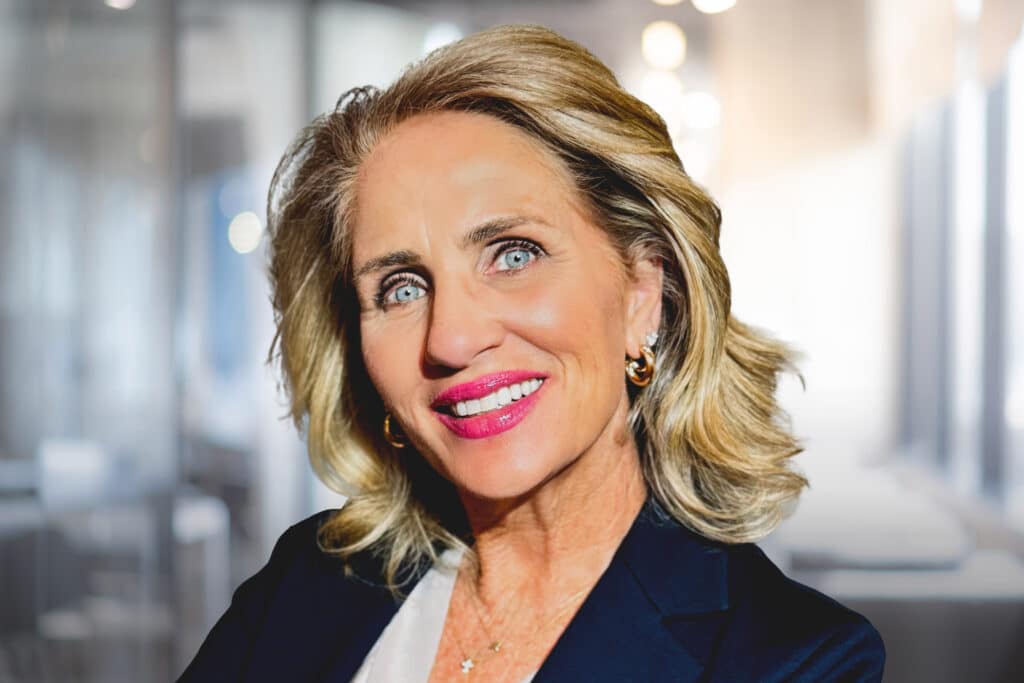
Hanson’s Guardian Sports is a family-owned company dedicated to serving athletes through safety and performance improvements in sports equipment. Major products include the Guardian Cap, PEARL ball and Guardian Infill serving the sports industry.
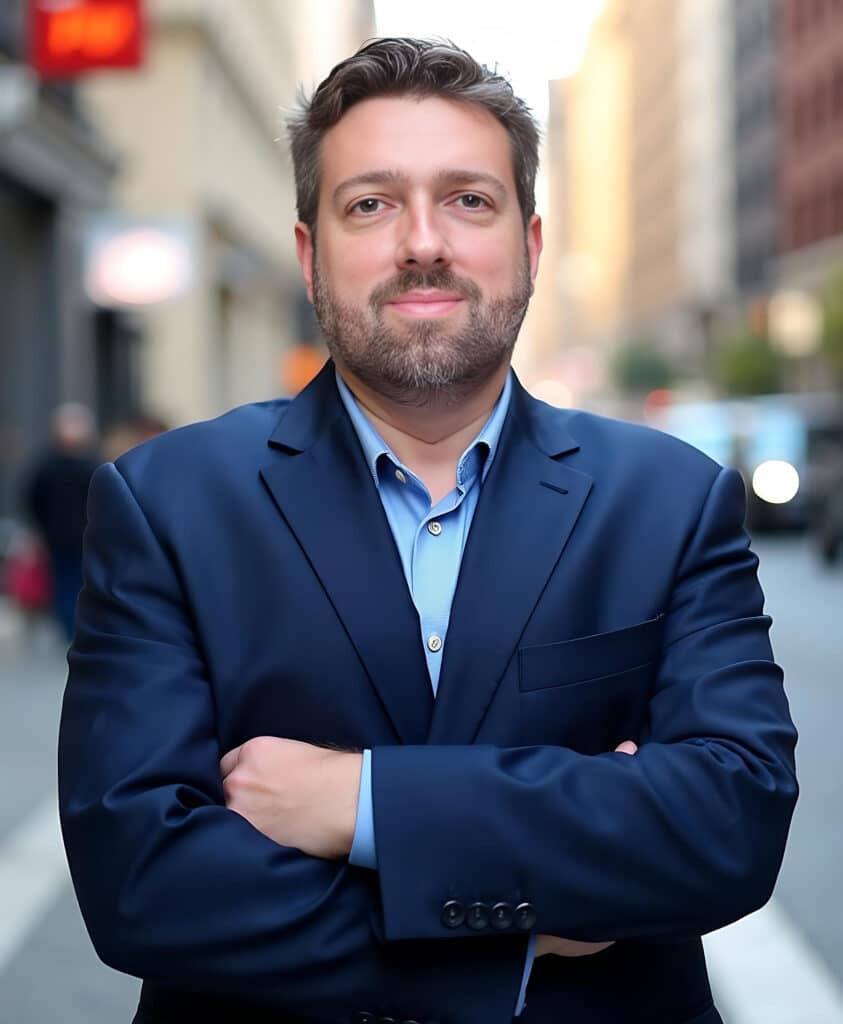
DLB Associates is a U.S.-based consulting engineering firm specializing in mission-critical and complex built environments. With more than 40 years of expertise, DLB delivers innovative, technology-driven solutions in engineering, commissioning and operations worldwide.
Celebrating entrepreneurial leaders
Now in its 40th year, Entrepreneur Of The Year recognizes the bold leaders who disrupt markets through the world’s most ground-breaking companies, revolutionizing industries and making a profound impact on communities. The program honors those entrepreneurs whose innovations shape the future and pave the way for a thriving economy and a hopeful tomorrow.
The Southeast program celebrates entrepreneurs from Alabama, Georgia, North Carolina, South Carolina and Tennessee.
An independent panel of judges selected 36 finalists for their entrepreneurial spirit, purpose, growth and lasting impact in building long-term value.
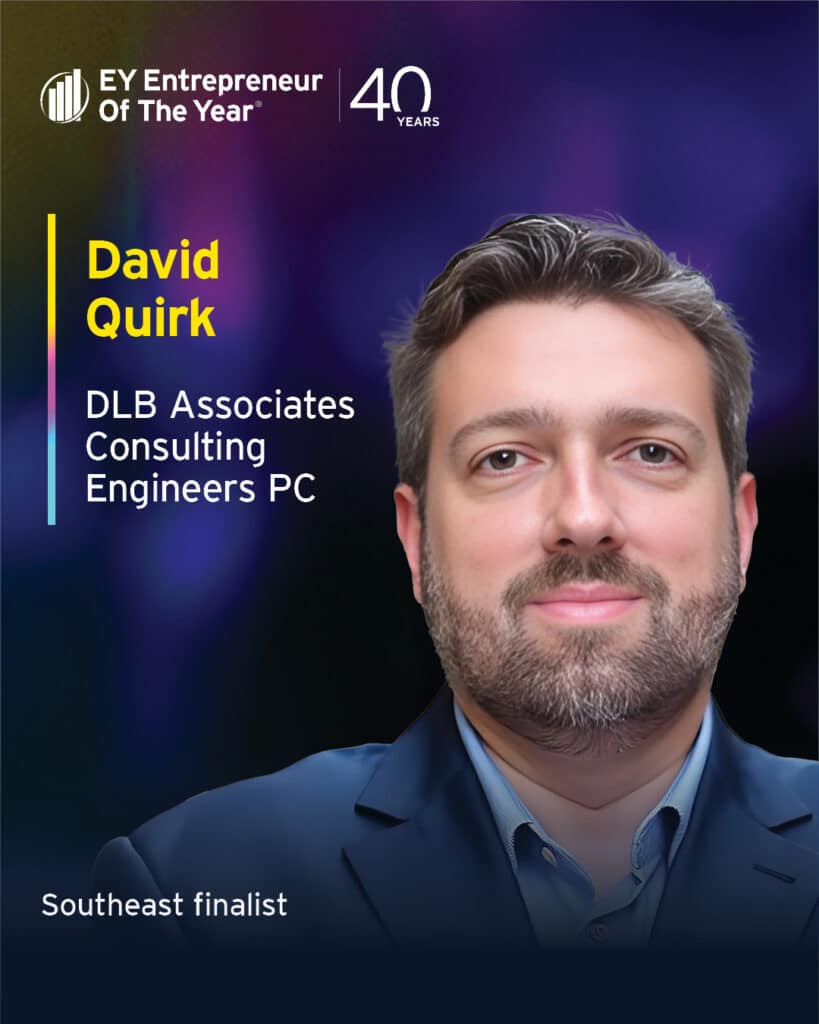
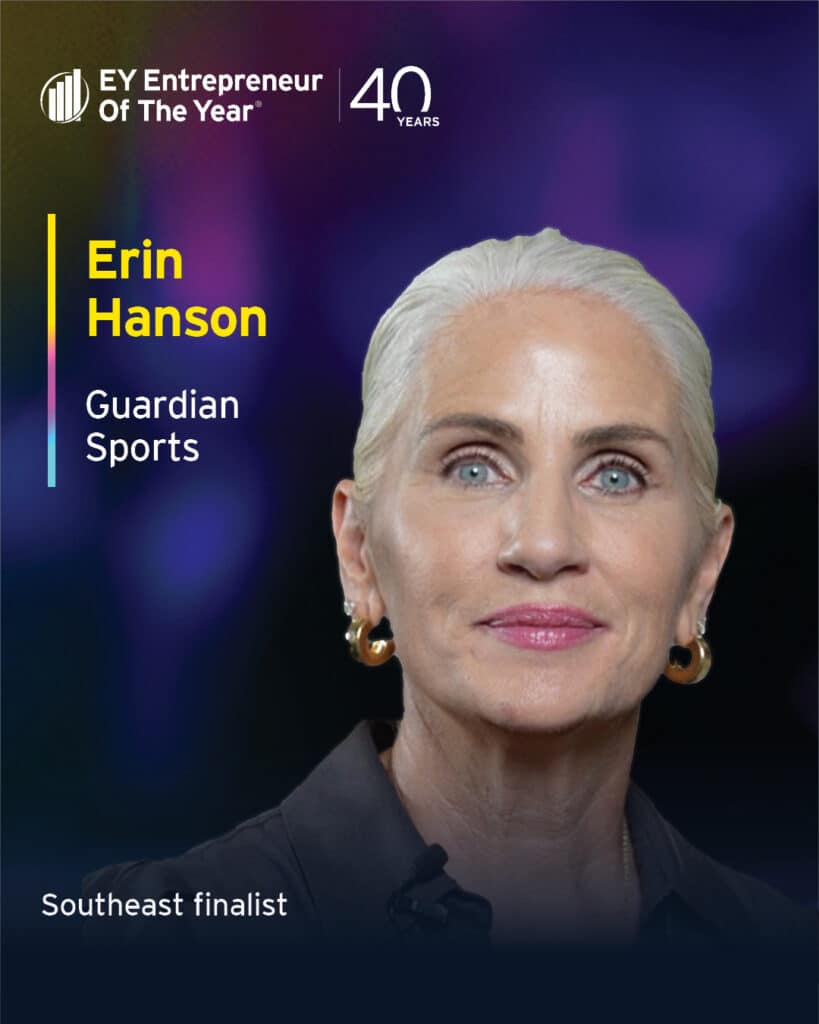
“This year’s finalists are leading examples of innovation, perseverance and resilience, illuminating paths to a brighter future for their industries and communities,” said Chevy Arnold, Entrepreneur Of The Year Southeast Program co-director.
“Their commitment to excellence transforms challenges into opportunities, inspiring us all,” added Kimberly Kicklighter, Entrepreneur Of The Year Southeast Program co-director.
Entrepreneur Of The Year honors many different types of business leaders for their ingenuity, courage and entrepreneurial spirit.
The program showcases original founders who bootstrapped their business from inception or who raised outside capital to grow their company; transformational CEOs who infused innovation into an existing organization to catapult its trajectory; and multigenerational family business leaders who reimagined a legacy business model to strengthen it for the future.
Including Quirk and Hanson, the 2025 Southeast finalists are:
- Marc Hodulich | 29029 | Atlanta, Georgia
- Damon Stafford | Alpine Intel | Charlotte, North Carolina
- Lou Hensley | Aspida | Durham, North Carolina
- Matthew Dent | Buffalo Rock Company | Birmingham, Alabama
- Melanie Little | Colonial Pipeline Company | Alpharetta, Georgia
- Will Bartholomew | D1 Training | Franklin, Tennessee
- Rene Diaz | Diaz Foods | Atlanta, Georgia
- David Quirk | DLB Associates Consulting Engineers PC | Peachtree Corners, Georgia
- Markus Scott | EyeQ Monitoring | Atlanta, Georgia
- Jon Gosier | FilmHedge | Atlanta, Georgia
- John Fitzpatrick | Force Marketing | Atlanta, Georgia
- Dr. Barry Patel | Galt Companies | Atlanta, Georgia
- Dr. Wade Smith | Galt Companies | Atlanta, Georgia
- Charles Gillespie | Gambling.com Group | Charlotte, North Carolina
- Kevin McCrystle | Gambling.com Group | Charlotte, North Carolina
- Mike Griffin | Griffin Brothers Companies | Cornelius, North Carolina
- Erin Hanson | Guardian Sports | Peachtree Corners, Georgia
- Dan Beem | Hissho Sushi | Charlotte, North Carolina
- Aaron Siegel | Home Team BBQ | Charleston, South Carolina
- Marc Murphy | Ignite Digital Services | Charleston, South Carolina
- Miller Chalk | Inglett & Stubbs, LLC | Mableton, Georgia
- Liza Rodewald | Instant Teams | Southern Pines, North Carolina
- Stephen Andresen | McClancy Foods & Flavors | Fort Mill, South Carolina
- Travis LeFever | Mission Mobile Medical Group | Greensboro, North Carolina
- Cyrus Mojdehi | Northway Homes | Charlotte, North Carolina
- Connor Ryan | NutraSky | Alpharetta, Georgia
- Fritz Owens | OTR Solutions | Roswell, Georgia
- Christopher Chuang | Relay, Inc. | Raleigh, North Carolina
- Kurt Jacobus | restor3d, Inc. | Durham, North Carolina
- Tom Kendrot | Shearwater Health | Nashville, Tennessee
- Teak Shore | Southern Lighting Source | Cumberland, Georgia
- Cindy Eckert | Sprout Pharmaceuticals | Raleigh, North Carolina
- Bryan Moore | TalkShopLive Inc. | Nashville, Tennessee
- Tina Moore | TalkShopLive Inc. | Nashville, Tennessee
- Igor Marinelli | Tractian | Atlanta, Georgia
- Joan Butters | Xsolis | Franklin, Tennessee
You can learn more about the finalists at ey.com/en_us/entrepreneur-of-the-year-us/southeast/winners-finalists.
Regional award winners will be announced on June 25 during a special celebration. The winners will then be considered by the national independent panel of judges for the Entrepreneur Of The Year National Awards, which will be presented in November at the annual Strategic Growth Forum®, one of the nation’s most prestigious gatherings of high-growth, market-leading companies.

About Entrepreneur Of The Year
Founded in 1986, Entrepreneur Of The Year has celebrated more than 11,000 ambitious visionaries who are leading successful, dynamic businesses in the U.S., and it has since expanded to nearly 60 countries globally.
The U.S. program consists of 17 regional programs whose panels of independent judges select the regional award winners every June. Those winners compete for national recognition at the Strategic Growth Forum® in November where national finalists and award winners are announced.
The overall national winner represents the U.S. at the EY World Entrepreneur Of The Year™ competition.
For more about the award, visit ey.com/us/eoy.
Related
Business
SCB Construction Group Partners with CGA Reps on New Peachtree Corners HQ
Published
1 week agoon
April 15, 2025
SCB Construction Group, freshly rebranded from SteelCo, secures construction project with CGA Reps for new office HQ in Peachtree Corners
SCB Construction Group has announced a strategic partnership with CGA Reps to build a new office headquarters in Peachtree Corners. The project, encompassing approximately 26,000 square feet of innovative workspace, marks a significant milestone in advancing CGA Reps’ corporate vision while showcasing SBA Construction Group’s commitment to delivering transformative construction solutions.
In collaboration with Oakley Real Estate Partners — serving as developers of the project on behalf of CGA Reps — this venture reflects a united effort to bring cutting-edge design (from Smallwood architecture firm) and operational excellence to the commercial kitchen equipment industry.
The announcement follows several high-profile projects for SCB Construction Group in 2024, including a 72,500-square-foot manufacturing center and headquarters for Process Equipment & Controls, an impressive interior build-out for Courtesy Ford Conyers’ commercial service center and the Phase 1 completion for StoreEase Loganville — recently honored as a 2024 Smart Facility of the Year by Modern Storage Media.
A bold new chapter for CGA Reps
The new 25,890-square-foot headquarters is designed to be more than just a workplace — it is envisioned as an inspiring environment that serves both client engagements and employee creativity. CGA Reps is recognized as an industry expert in commercial kitchen equipment, representing leading manufacturers, warehousing, distributing and installing everything from fryers to commercial walk-in freezers.
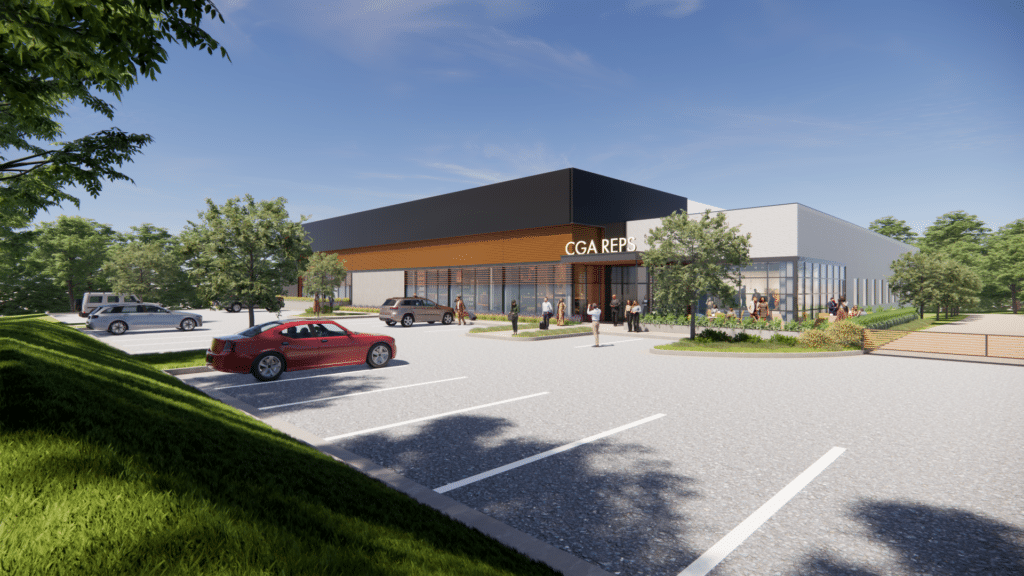
The facility’s design reflects this expertise, featuring a dedicated approximately 9,000-square-foot showroom kitchen that will host equipment demonstrations, tradeshows and webinars. This dynamic space will allow CGA Reps to showcase its comprehensive product range and provide clients with hands-on experiences of the latest commercial kitchen innovations.
A standout feature of the project is its innovative approach to stormwater management. With the site comprising only three acres, sufficient space for a traditional detention pond does not exist. To overcome this challenge, the design includes an underground detention system located beneath the truck court to efficiently handle all stormwater runoff.
This solution not only maximizes the use of the available land but also reinforces CGA Reps’ commitment to sustainable practices.
“We are excited to embark on this project with CGA Reps,” said Jay Bailey, CEO of SCB Construction Group. “This partnership underscores our commitment to customer excellence in design and construction, and it is a testament to the trust our clients place in our ability to deliver projects that not only meet but exceed expectations.”
Delivering excellence through proven expertise
SCB Construction Group’s track record in 2024 has been nothing short of remarkable. Earlier in the year, the company completed a 72,500 square foot manufacturing center for Process Equipment & Controls, integrating office space within a dynamic production facility.
This project was celebrated for its innovative design that balanced operational efficiency with a modern aesthetic, utilizing IMP panels to mimic tilt-up concrete, setting new standards for manufacturing environments.
Similarly, the interior build-out for Courtesy Ford Conyers’ commercial service center demonstrated SCB Construction Group’s ability to transform conventional spaces into functional and attractive environments that cater to both customer and staff needs.
The company’s commitment to quality and precision was again evident in the successful Phase 1 completion for StoreEase Loganville. This project, which recently earned the distinction of a 2024 Smart Facility of the Year by Modern Storage Media, highlights SCB Construction Group’s forward-thinking approach to construction and design, incorporating smart technologies and design that enhance sustainability and operational efficiency.
A rebranding that reflects a vision for the future
In a move that signals its evolution and growth, SCB Construction Group has recently rebranded from its former identity, SteelCo Buildings, as it spins off its construction division. This strategic rebranding is not merely cosmetic — it represents a renewed commitment to capabilities, credibility and client-focused service.
The refreshed brand is anchored by a new tagline “Deep Expertise, High Expectations” and a clear brand promise that communicates the company’s mission: to craft exceptional construction experiences based on precision, innovation and trust.
“Our rebranding is about more than just a new name or logo; it’s a renewed promise to our clients and communities,” explained Robert Lee, marketing director at SCB Construction Group. “We believe that our updated brand identity, including our invigorated tagline and mission statement, encapsulates our dedication to pushing the boundaries of design and construction. It reflects our commitment to creating spaces that are as inspiring as they are functional.”
Transforming spaces to inspire and connect
The new headquarters for CGA Reps is expected to become a landmark facility in Peachtree Corners. Beyond its impressive architectural design and advanced construction techniques, the building is planned as a hub for innovation and collaboration.
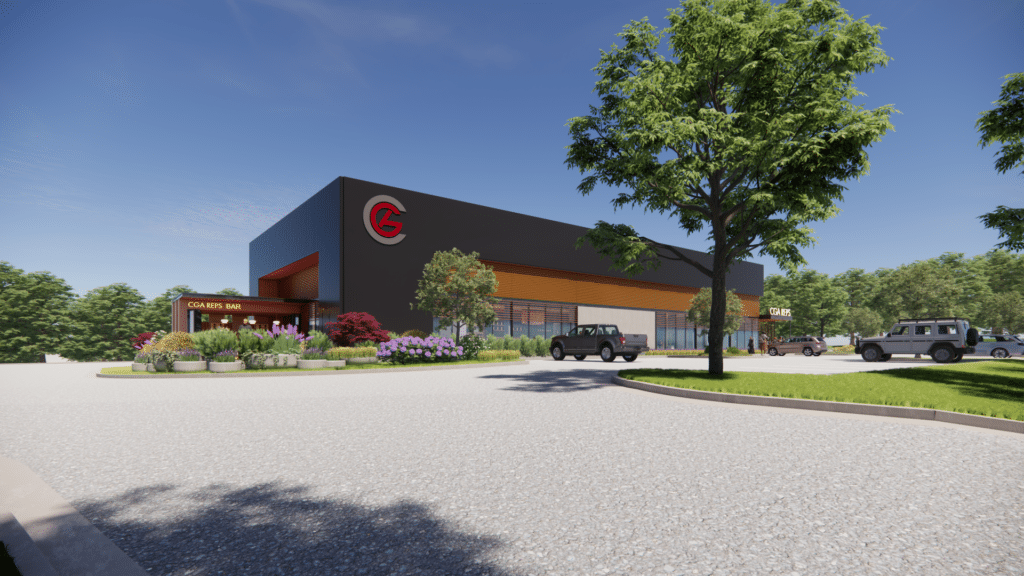
The interior build-out will include dynamic client reception areas, interactive meeting rooms, and dedicated spaces designed to foster creativity and teamwork among employees. The layout is crafted to ensure that every area of the facility contributes to a productive and inspiring work environment.
“By investing in this state-of-the-art facility, CGA Reps is making a strong statement about the future of work,” said Bryan Young, VP of construction at SCB Construction Group. “Our team is dedicated to designing and building spaces that not only serve the immediate needs of our clients but also create environments that motivate and inspire. The new headquarters will be a testament to that vision.”
Looking ahead
The partnership between SCB Construction Group and CGA Reps marks a significant step forward for both companies. As SCB Construction Group continues to build on its legacy of excellence and innovation, this project is poised to set a new benchmark for modern office headquarters design in the region.
With a strategic focus on creating spaces that inspire, connect and drive success, the future looks promising for both SCB Construction Group and its esteemed partner, CGA Reps.
For more information on the new headquarters project or to learn more about SCB Construction Group’s portfolio, visit scbcg.com.
Related
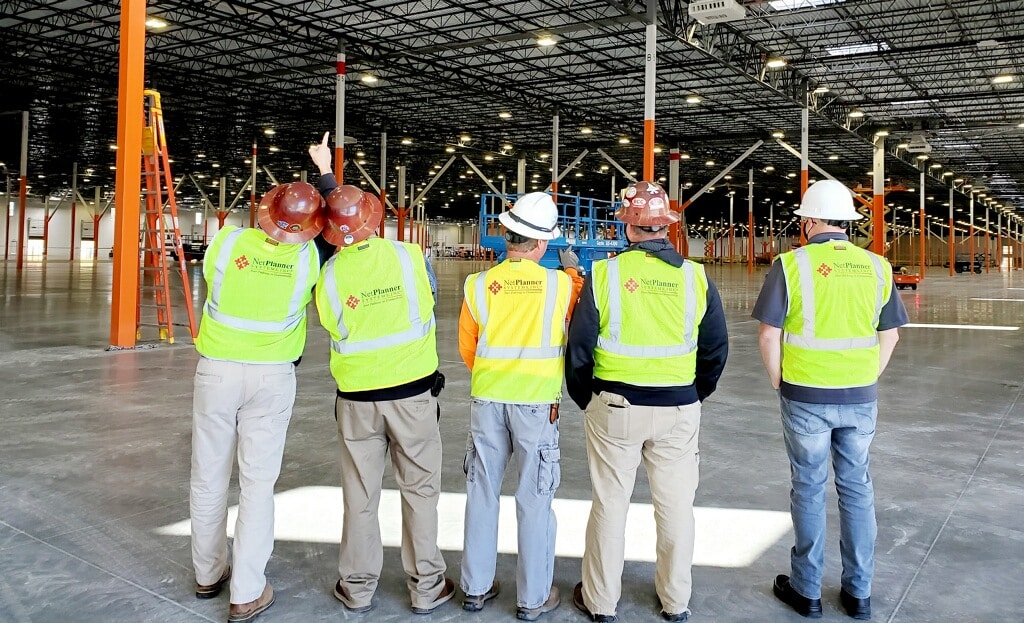
How NetPlanner Systems powers businesses with tech-forward services and solutions
Anyone who’s been in business for more than a decade — maybe even less than that — can attest to the changes one must make to stay relevant. Such is the case with NetPlanner Systems.
During a discussion recently with Southwest Gwinnett magazine, CEO Clint Bridges explained that NetPlanner was an outgrowth of another company he started in 1983, initially in Mableton and later moved to the Peachtree Corners/Norcross area in 1985.
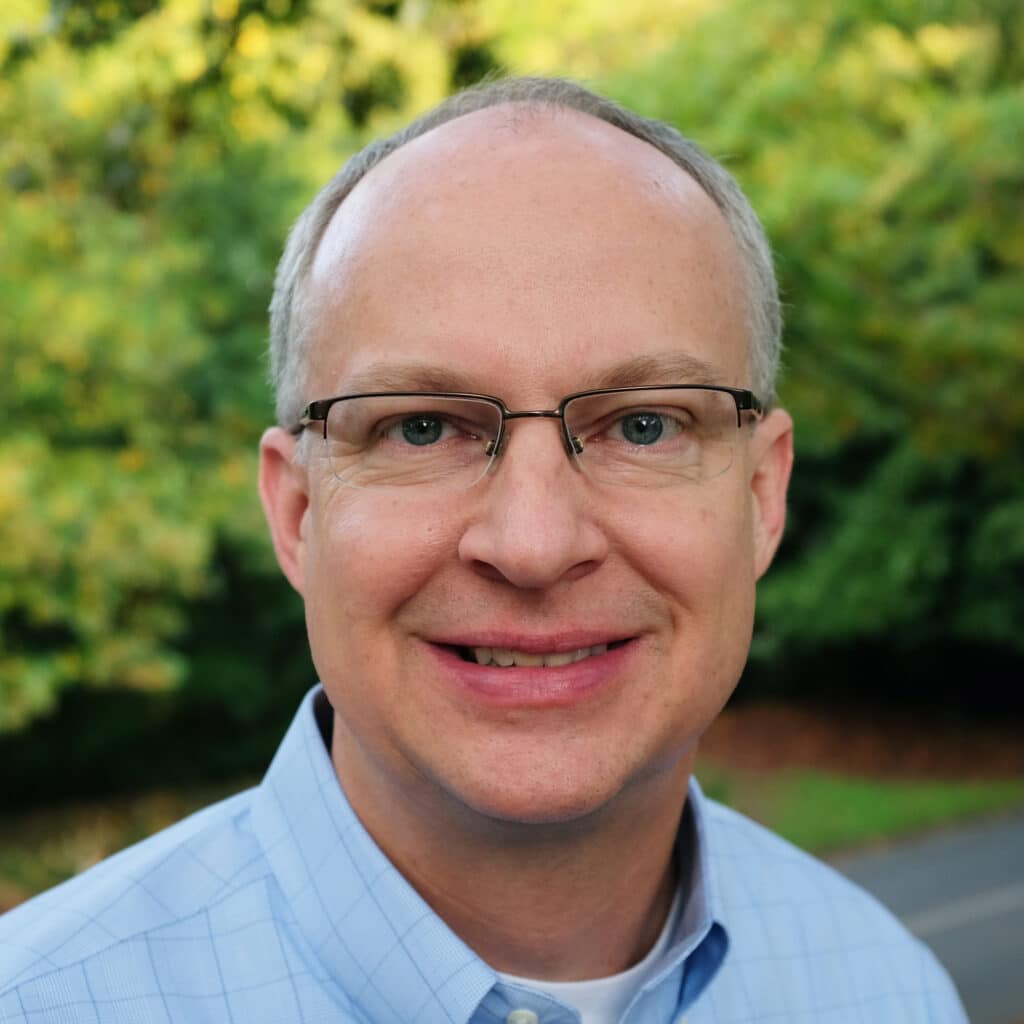
The first company manufactured printer and modem cables, which were in high demand during the early personal computer market boom. The company transitioned from manufacturing to providing networking services in 1987 due to the shift in the market and the desire to stay in a service-oriented business.
“Those cable assemblies sold for higher margins in the early days of the PC market. Rapidly, a lot of that manufacturing went offshore, and the margins went down, and a number of my competitors decided just to become brokers in that field,” said Bridges. “I didn’t really want to become a broker. I am very technical, very hands on, and so I sold that first business in 1986.”
Services and market reach
The contacts and trust he’d built with customers prompted him to go another route.
“Local area networking was starting to come into the marketplace, and so instead of manufacturing cable assemblies, we started to do networking, which involves putting network cabling and related hardware into commercial buildings,” he said.
NetPlanner built some of the earliest networks in the area.
“This was back in the days before there were any standards for this,” Bridges added.
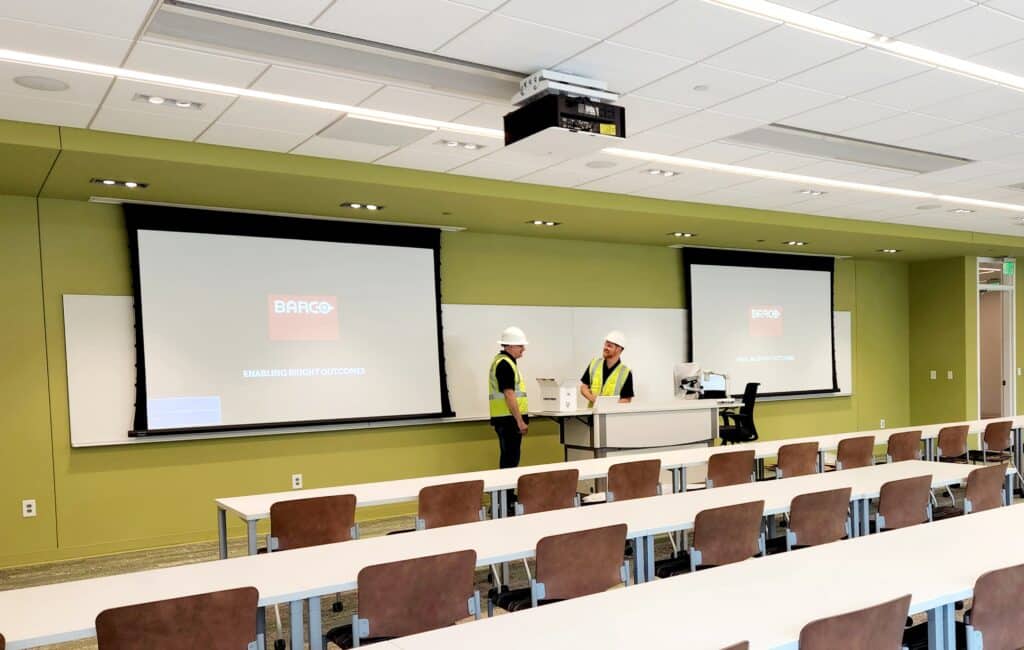
Today NetPlanner provides complete design services, installation and ongoing maintenance of all communication systems in commercial buildings, focusing primarily on hardware. The company also runs a network services division that offers help desk support for small businesses without their own IT departments.
“That’s what really caused NetPlanner to be formed in 1987 — the desire to be in a service business and to provide a service that was still working with the same sorts of clientele in the computer marketplace,” he said.
NetPlanner works with a variety of commercial enterprises, as well as K-12 schools, colleges, universities and large hospital systems.
“Everything that wasn’t on the IP network in a commercial building before 1990 started to fall onto the IP network,” said Bridges. “Things that we never anticipated, including telephone systems, which were totally separate back in the 1980s, now all operate over IP-based systems.”
In addition, things like security and access control, video surveillance and similar systems all work on IP networks.
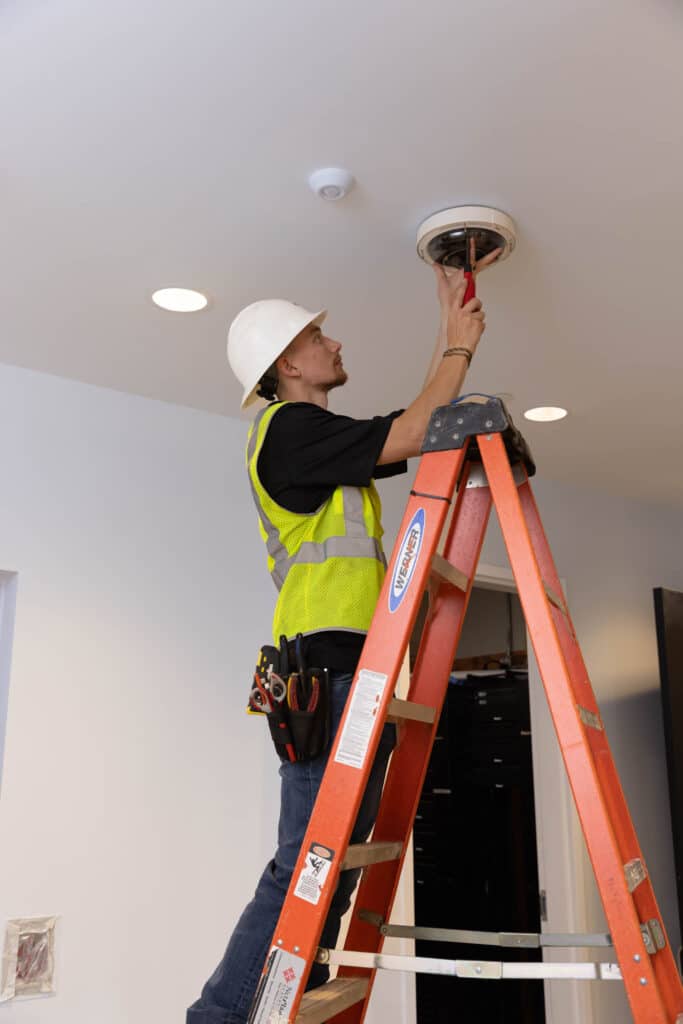
“So as time has gone on, NetPlanner has received requests from our customers to install these other systems, and we’ve embraced the other technologies that are now a part of almost all commercial buildings,” he added.
The company is now expanding its services to include nurse call services for hospitals — one of the newer markets for NetPlanner.
Security and access control systems
With ever-changing business technology needs, NetPlanner successfully keeps current with trends. With heightened security concerns everywhere, the company installs biometric readers and smart camera systems for access control.
“We provide a wide variety of smart camera systems, where they can do recognition, license plate recognition, facial recognition — all those kinds of intelligent systems for commercial spaces,” he said.
Building relationships with a wide variety of manufacturers who provide different types of software systems is how NetPlanner meets the needs of its clients.
“We work with whatever software system the particular enterprise feels is most appropriate for their needs, depending on whether they want to do license plate recognition or face recognition,” said Bridges. “We do a tremendous amount of security camera work in schools all over the southeast. And that is becoming more top of mind in school systems now.”
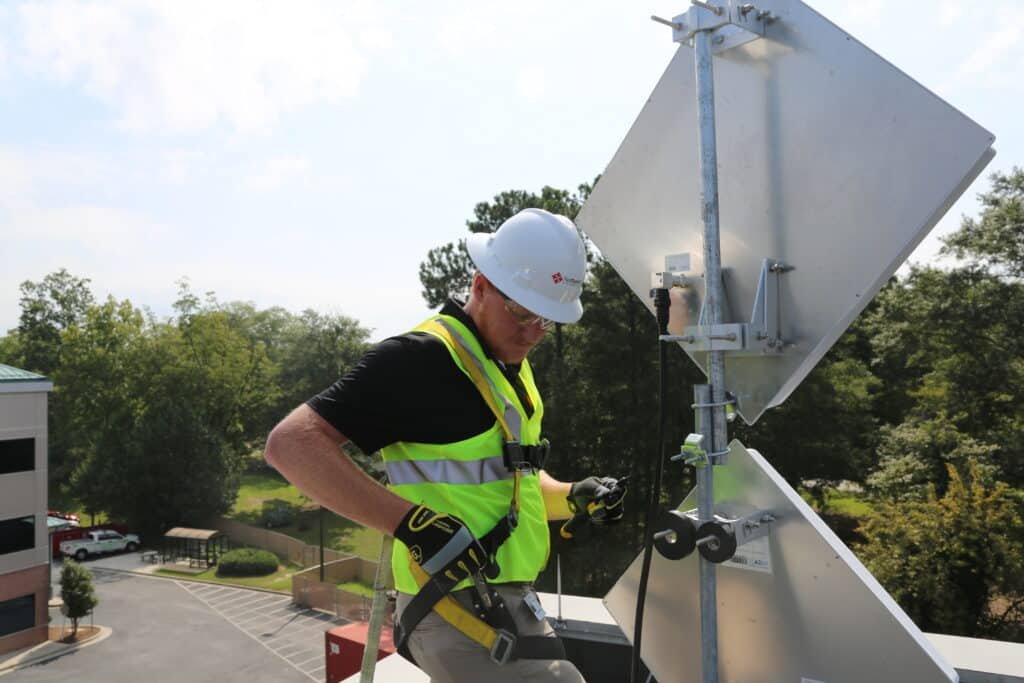
But there’s more. NetPlanner also provides distributed antenna systems (DAS) to improve cell phone coverage in commercial spaces.
“Cell carriers are concerned about not just signal strength, but also channel capacity — the ability to have a much larger number of users that might be around a particular cell tower at any given point in time,” said Bridges.
When installing a DAS, NetPlanner’s proficiency in coordinating with the carriers ensures compliance with carrier requirements and optimizes signal strength and coverage throughout the building.
Evolution of the technology-driven company
Anyone who knows Clint Bridges shouldn’t be surprised that he’s right in the thick of the technology boom. He started his first company at 19 and attended Southern Tech for a while before focusing on entrepreneurship.
“My passion for technology goes back to my earliest years. I’ve been fascinated by electronics and computers since I was very young. And I always had a home laboratory in the basement of the house as I was growing up,” he said. “I knew when I was in high school that I wanted to be an entrepreneur. During my time at Southern Tech, I started my first company and realized that’s what I wanted to do more than be at Southern Tech.”
NetPlanner is not only a local company. It operates fully-staffed branch offices in Augusta, Columbus and Savannah, as well as in Nashville, Tennessee; Raleigh, North Carolina; and Tampa, Florida. It has also provided services in every U.S. state, as well as parts of the Caribbean, Canada, London and Puerto Rico.
“We do projects all over the country, including some that are for companies that need to do national rollouts,” Bridges said. “A lot of our customers want to see the exact same approach used consistently throughout all their facilities across the country. So they’ll look to a company like NetPlanner to go and provide that consistent installation of all their communications technology needs in all their facilities across the country.”
Community commitment
Whether it’s working with manufacturing facilities and distributors, some of the largest big box organizations in the country, small retail businesses or anything in between, NetPlanner never loses sight of the local community.
With a home base in Peachtree Corners, the company has strong community involvement — including adopting a roadway section for clean-up efforts and participating in local chamber of commerce activities. NetPlanner has been active in several community events, such as shoe drives, food drives and charity walks, demonstrating its commitment to giving back.
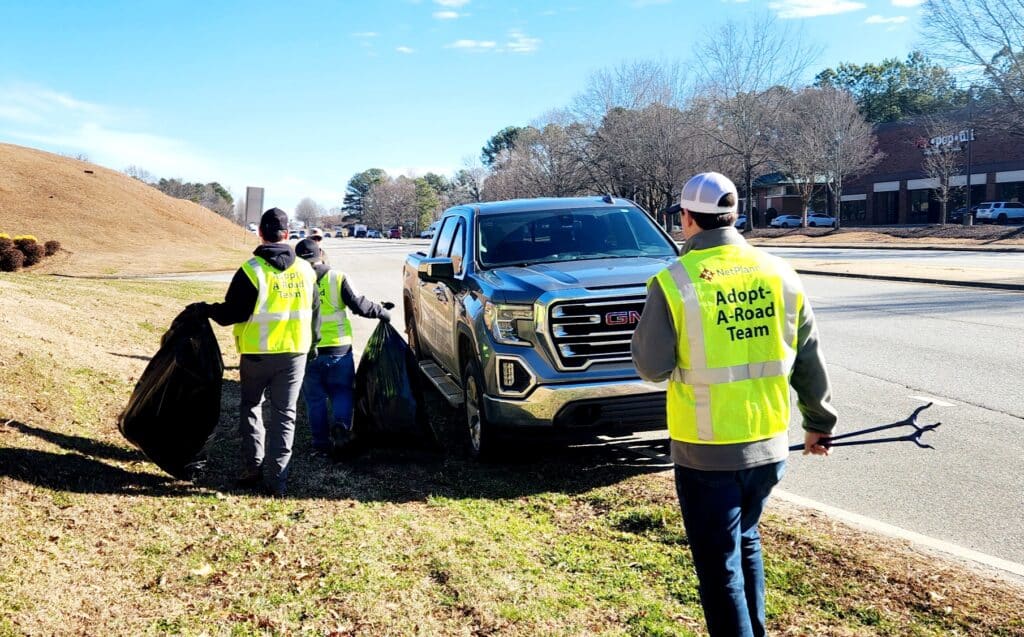
“Since 2018, we’ve adopted a roadway section in the community through Gwinnett Clean and Beautiful,” said Michelle Bruck, marketing specialist at NetPlanner. “We go out about five times a year, clear debris off of that roadway and just make sure that it’s beautiful and that it’s safer for people who are walking or driving in the area.”
Nationally, NetPlanner participates in Toys for Tots and Walk to End Alzheimer’s.
“Not only [do we give back] in our headquarters location, but all of our branch offices look for ways to help, get involved and support our communities that we’re part of,” Bruck added.
NetPlanner’s marketing efforts include social media, direct marketing and trade shows, with support from Vox-Pop-Uli for branded materials and printed media.
“When we first started using Vox-Pop-Uli, we had just a straightforward vendor relationship, but they very quickly became a partner to us,” said Bridges. “Vox-Pop-Uli has actually set up a company store on our behalf where our employees can purchase branded material, branded clothing, ball caps and those sorts of things. And they also handle printed media — things that we would use at trade shows.”
Looking forward
With technology moving at a warp speed, NetPlanner relies on a lot of repeat business.
“Bandwidth requirements are increasing year after year,” Bridges said. “Fiber optic cabling that we might have installed 10 years ago won’t support the data rates that are needed today, so it needs to be changed out in many cases.”
Many of the customers that he’s been with for several decades use NetPlanner’s services over and over.
“We’ve gone into the same building and re-cabled it over and over again as the different category levels of copper cabling have advanced,” he said. “The demands on fiber are now way beyond what they were even five years ago because the capacity has increased so much.”
And as everyone is embracing artificial intelligence, Bridges said he’s working to keep up.
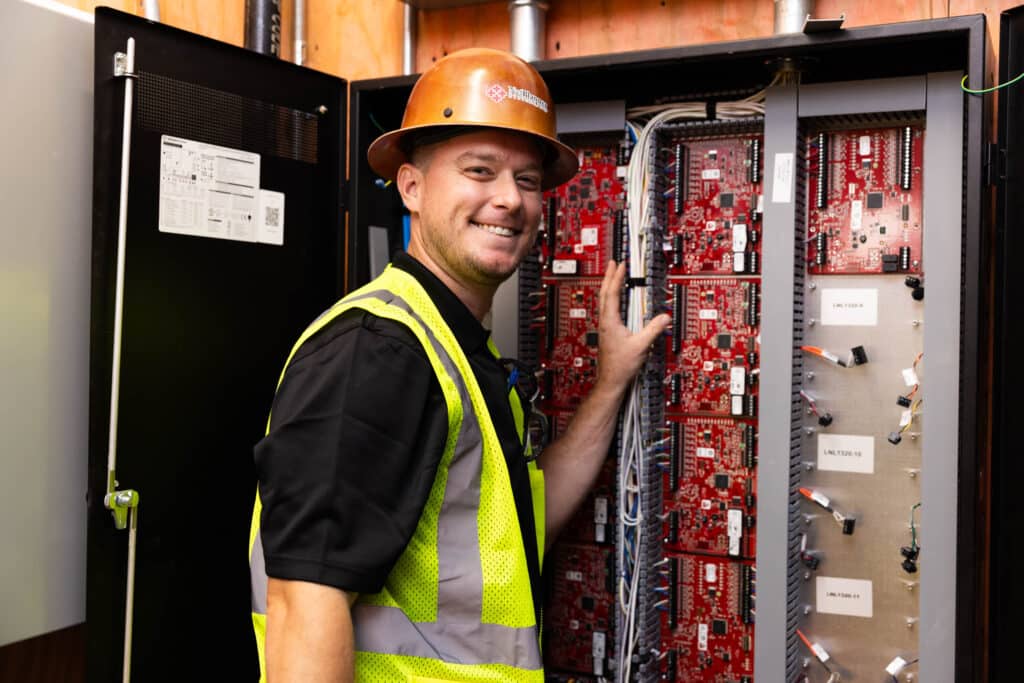
“Everyone is well aware of what’s happening in the artificial intelligence space. And what’s really amazing to us is the number of new data centers that are being built across the United States by all the major players,” he said. “It’s kind of hard to imagine even being able to keep up with all that. We do a lot of data center work ourselves, and are trying to engage with more of our customers to help build some of these newer data centers.”
He added that the artificial intelligence boom is causing so much additional strain on the network infrastructure across the country, there are concerns about how it’s all going to be powered.
“I think everyone’s concerned,” he said. “Everyone that’s involved in this is wondering how we’re going to meet the bandwidth demands, the capacity demands, the power demands to make all this work.”
Staying ahead of the curve
With decades of experience, Bridges offers advice for all types of businesses starting out — put technology needs into your business model early on.
“The companies that struggle the most with technology are the ones that wait until after everything with the building is developed and completely built before they realize that they need Wi-Fi or some other network installation done,” he said. “It’s just a much more efficient process if we’re involved as early as possible to help design the network, along with the building structure itself.”
He also emphasized the importance of staying ahead of technological advancements to avoid falling behind.
“As fast as technology moves, if you get behind the power curve, it’s really hard to catch up,” he added.
The Local Thread: This business profile series is proudly supported by Vox-Pop-Uli, championing local stories and the communities we serve.
Related
Read the Digital Edition
Subscribe
Keep Up With Peachtree Corners News
Join our mailing list to receive the latest news and updates from our team.
You have Successfully Subscribed!

Peachtree Corners Prepares for Another Roundabout

Experience Shakespeare in the Park with Contemporary Classics’ Twelfth Night

The Future of Law Enforcement in Peachtree Corners: Community Meeting

SCB Construction Group Partners with CGA Reps on New Peachtree Corners HQ

GA Tech, Peachtree Corners Solidify Partnership with First-of-its-Kind Venue

Two Peachtree Corners Business Leaders Named Finalists for EY Entrepreneur Award

Peachtree Corners City Guide 2025: Spring/Summer Digital Edition

Peachtree Corners City Guide 2025: Spring/Summer Digital Edition

Two Peachtree Corners Business Leaders Named Finalists for EY Entrepreneur Award

GA Tech, Peachtree Corners Solidify Partnership with First-of-its-Kind Venue

SCB Construction Group Partners with CGA Reps on New Peachtree Corners HQ

The Future of Law Enforcement in Peachtree Corners: Community Meeting

Peachtree Corners Prepares for Another Roundabout

Experience Shakespeare in the Park with Contemporary Classics’ Twelfth Night

Registration Now Open for Light Up the Corners 2025

Light up the Corners [Video]

Capitalist Sage: Business Leadership in Your Community [Podcast]

Cliff Bramble: A Culinary Adventure through Italy

Top 10 Brunch Places in Gwinnett County

A Hunger for Hospitality

THE CORNERS EPISODE 3 – BLAXICAN PART 1

Top 10 Indoor Things To Do This Winter

The ED Hour: What it takes to Remove Barriers from Education








